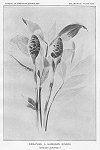
Click to enlarge
PLATE XXII
AWA-PUHI, A HAWAIIAN GINGER
(ZINGIBER ZERUMBET)
The hula kí-e-léi, or kí-le-léi, was a performance of Hawaii's classic times. and finds mention as such in the professedly imperfect list of hulas given by the historian David Malo. a It was marked by strenuous bodily action, gestures with feet and hands, and that vigorous exercise of the pelvis and body termed ami, the chief feature of which was a rotation of the pelvis in circles and ellipses, which is not to be regarded as an effort to portray sexual attitudes. It was a performance in which the whole company stood and chanted the mele without instrumental accompaniment.
The sacrifice offered at the kuahu in connection with the production of this hula consisted of a black pig, a cock of the color termed ula-hiwa--black pointed with red--a white hen, and awa. According to some authorities the offerings deemed appropriate for the sacrifice that accompanied each hula varied with the hula, but was definitely established for each variety of hula. The author's studies, however, lead him to conclude that, whatever may have been the original demands of the gods, in the long run they were not over-particular and were not only willing to put up with, but were well pleased so long as the offering contained, good pork or fish and strong awa.
Mele

Click to enlarge
PLATE XXII
AWA-PUHI, A HAWAIIAN GINGER
(ZINGIBER ZERUMBET)
[Translation]
Song
At first blush this mele seems to be the account of a perilous climb through that wild mountainous region that lies back of Hanalei, Kauai, a region of tangled woods, oozy steeps, fathomless bogs, narrow ridges, and overhanging cliffs that fall away into profound abysses, making such an excursion a most precarious adventure. This is what appears on the surface. Hawaiian poets, however, did not indulge in landscape-painting for its own sake; as a rule, they had some ulterior end in view, and that end was the portrayal of some primal human passion, ambition, hate, jealousy, love, especially love. Guided by this principle, one asks what uncouth or romantic love adventure this wild mountain climb symbolizes. All the Hawaiians whom the author has consulted on this question deny any hidden meaning to this mele.
210:a Hawaiian Antiquities, by David Malo; translated by N. B. Emerson, A. M., M. D. Honolulu, the Hawaiian Gazette Company (Limited), 1903.
210:b Hanalei-lehua. A wilderness back of Hanalei valley, Kauai, in which the lehua tree-abounds. The features of this region are as above described.
210:c Kaó’o. To bend down the shrubs and tussocks of grass to furnish solid footing in crossing swampy ground.
210:d Naé’le. Boggy ground; a swamp, such as pitted the summit of Kauai's central mountain mass, Waiáleále.
210:e A'a lewalewa. Aerial roots such as are put forth by the lehua trees in high altitudes and in a damp climate. They often aid the traveler by furnishing him with a sort of ladder.
211:a U'i elua. Literally two beauties. One interpreter says the reference is to the arms, with which one pulls himself up; it is here rendered " flanks."
211:b Ki-ki’i ka ua i ka nana keia, la. The meaning of this passage is obscure. The most plausible view is that this is an exclamation made by one of the two travelers while crouching for shelter under an overhanging bank. This one, finding himself unprotected, exclaims to his companion on the excellence of the shelter he has found, whereupon the second man comes over to share his comfort only to find that he has been hoaxed and that the deceiver has stolen his former place. The language of the text seems a narrow foundation on which to base such an incident. A learned Hawaiian friend, however, finds it all implied in this passage.